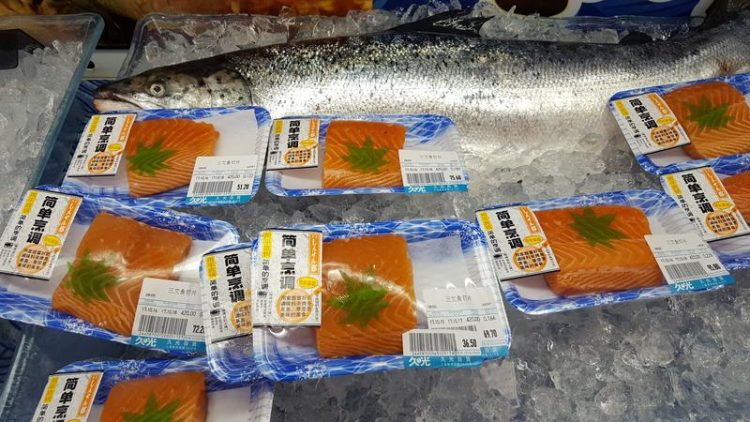Know your fish!

Salmon packed in the cooling shelf of a high-end supermarket in Shanghai/China. Kiel researcher developed a new method for tracing protein sources of farmed and wild salmon. Foto: Thomas Larssen, Kiel University
More than half of the world’s fish and seafood products come from aquaculture. The increasing demand and the simultaneous decline of the natural stocks due to overfishing have led to strong growth of the aquaculture industry for decades. To reduce costs and impact on wild fish stocks, carnivorous fish are increasingly fed plant-based diets in aquaculture.
However, the rapid development in aquaculture fish production has not been matched by new methods that accurately can trace the food chain supply in aquaculture production. With stable isotope fingerprinting, an international team lead by researchers from Kiel University and the Kiel Cluster of Excellence “The Future Ocean” has developed a new method for identifying the protein sources of salmon with high accuracy. In this way, conclusions can be drawn about the origin and nutrition of individual fish. The results of the study were recently published in the international journal Food Chemistry.
In recent years, commercial compound diets in aquaculture have gone from a single source of protein, fishmeal, and a single source of lipid, fish oil, to more than several dozen ingredients such as soy, insects, macroalgae, mussels and yeast.
For example, since 2015 conventionally farmed Atlantic salmon (Salmo salar L.) have been fed only 20% marine based diets as opposed to 90% four decades ago. This diversification in feed ingredients has brought benefits in terms of reduced production costs and has, at least in part, decreased pressure on wild fish stocks.
However, up to now new methods that can accurately trace the food chain supply in aquaculture production had been missing. Since consumers are increasingly demanding food safety, traceability, and sustainability, there is a pressing need to develop new authentication and traceability methods. For the first time, an international team lead by researchers at Kiel University and the Kiel Cluster of Excellence “The Future Ocean” has succeeded in developing such an efficient authentication method.
“Our method, stable isotope fingerprinting of amino acids, has several advantages compared to conventional methods. For the first time, we can differentiate organic, conventional, and wild salmon from different origins” explains first author Dr. Yiming Wang from the Leibniz-Laboratory for Radiometric Dating and Stable Isotope Research at Kiel University. “We are also able to differentiate salmon fed alternative diet ingredients such as insect meal and macroalgae.”
The new method will help to ensure that sustainable aquaculture products are produced in compliance with standards such as the EU Ecolabel and other organic certification programs. Potentially, the isotope fingerprinting method can also support the new blockchain movement for enhancing food safety and production transparency.
“We are very excited about our findings,” says the senior author Dr. Thomas Larsen Leibniz Laboratory for Radiometric Dating and Stable Isotope Research at Kiel University. “Our method can be expanded to authenticate other seafood products. This is a step towards promoting healthy and environmentally sound aquaculture practices.”
Read the full story here: https://authors.elsevier.com/a/1Wj3s16Ds1e1jV. Free download until May 3, 2018.
Original Work
Wang, Y. V., A. H. L. Wan, E.-J. Lock, N. Andersen, C. Winter-Schuh, and T. Larsen. 2018. Know your fish: A novel compound-specific isotope approach for tracing wild and farmed salmon. Food Chemistry 256:380-389. https://doi.org/10.1016/j.foodchem.2018.02.095
Links
https://authors.elsevier.com/a/1Wj3s16Ds1e1jV
http://www.futureocean.org
http://www.leibniz.uni-kiel.de/en
Contact
Dr. Yiming Wang, ywang@leibniz.uni-kiel.de
Friederike Balzereit
Public Relations
Cluster of Excellence „The Future Ocean”
0431-880-3032, fbalzereit@uv.uni-kiel.de
http://www.uni-kiel.de/pressemeldungen/index.php?pmid=2018-079-aquakultur&la…
Media Contact
All latest news from the category: Life Sciences and Chemistry
Articles and reports from the Life Sciences and chemistry area deal with applied and basic research into modern biology, chemistry and human medicine.
Valuable information can be found on a range of life sciences fields including bacteriology, biochemistry, bionics, bioinformatics, biophysics, biotechnology, genetics, geobotany, human biology, marine biology, microbiology, molecular biology, cellular biology, zoology, bioinorganic chemistry, microchemistry and environmental chemistry.
Newest articles

Properties of new materials for microchips
… can now be measured well. Reseachers of Delft University of Technology demonstrated measuring performance properties of ultrathin silicon membranes. Making ever smaller and more powerful chips requires new ultrathin…

Floating solar’s potential
… to support sustainable development by addressing climate, water, and energy goals holistically. A new study published this week in Nature Energy raises the potential for floating solar photovoltaics (FPV)…

Skyrmions move at record speeds
… a step towards the computing of the future. An international research team led by scientists from the CNRS1 has discovered that the magnetic nanobubbles2 known as skyrmions can be…





















